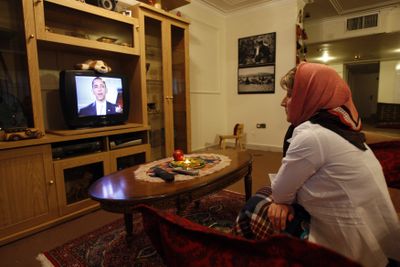Obama video to Iran takes ‘respect’ tack

WASHINGTON – Under former President George W. Bush, America’s rhetoric toward Iran was usually tough, but it often backfired and helped hardliners portray the United States as an enemy, according to specialists in Tehran and Washington.
President Barack Obama abandoned his predecessor’s approach Friday in a 3 1/2 -minute videotaped message that offered negotiations and was deliberately laced, U.S. officials said, with not-so-subtle diplomatic code.
Obama used Iran’s formal name, the Islamic Republic of Iran – which Bush never did – suggesting that the White House isn’t out to topple the country’s 30-year-old Islamic revolution. He also twice offered Iran his “respect,” something the country’s people and leaders crave.
Although it appears unlikely to lead to any near-term breakthroughs, Obama’s new Iran policy could undercut Iranian hawks who oppose better ties with the United States just as Iran prepares for presidential elections in June.
“The Obama administration’s approach to Iran has been more informed and nuanced than any U.S. administration in the last three decades. He’s been respectful without projecting weakness, which is always a difficult balance,” said Karim Sadjadpour, of the Washington-based Carnegie Endowment for International Peace.
Still, he said: “At the moment, hardliners in Tehran who are not interested in having an amicable relationship with the U.S. have an inordinate amount of influence.”
Top U.S. officials aren’t optimistic that Iran under President Mahmoud Ahmadinejad will respond to Obama’s outreach, much less halt its support for terrorist groups or its suspected pursuit of nuclear weapons. Secretary of State Hillary Clinton voiced those doubts during closed-door talks with her Arab counterparts in Egypt three weeks ago, a senior State Department official said.
Iran’s initial reaction Friday to Obama’s message, timed to the ancient Persian spring holiday of Nowruz, was tepid.
“The Obama administration so far has just talked,” Aliakbar Javanfekr, an aide to Ahmadinejad, told the Reuters news agency. He called instead for “fundamental changes” in U.S. policy, including an end to support for Israel and economic sanctions on Iran.
Obama’s message to Iran also faces suspicion, if not outright resistance, from Israel, whose likely new right-wing government perceives Iran to be its No. 1 security concern.
The Obama administration is conducting a broad review of Iran policy that’s several weeks or more away from completion.
While White House and State Department officials are loath to discuss details, the administration is considering loosening restrictions on direct contacts with Iranian diplomats and asking Iran’s OK to establish a U.S. diplomatic post in Tehran for the first time in 30 years.
During last year’s presidential campaign, candidate Obama promised to pursue direct, high-level diplomacy with Iran’s leaders, and his message Friday was the latest of several feelers.
Triti Parsi, the president of the National Iranian American Council, which favors U.S. engagement with Iran, called Obama’s latest message “historic.” He said the president took the right track in not trying to ignore Iran’s leaders and speak only to the Iranian people, as Bush almost always did.
Bush’s rhetoric helped the fiery Ahmadinejad, and Obama’s approach “now may ‘un-help’ Ahmadinejad,” Parsi said.
Iranian reformists, who favor improved ties with the United States, also say the previous approach helped the hawkish camp in Iran’s divided political system, which often manipulates anti-American sentiment for political ends.
While Bush was in the White House, “reformists became weak,” reformist politician Mostafa Tajzadeh said in a recent interview in Tehran.